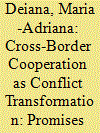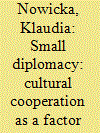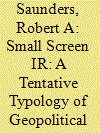|
|
|
Sort Order |
|
|
|
Items / Page
|
|
|
|
|
|
|
| Srl | Item |
| 1 |
ID:
167135


|
|
|
|
|
| Summary/Abstract |
Can we continue to view European Integration as a project associated with conflict transformation and peacebuilding through the promotion of soft borders and cross-border cooperation? Or are we faced with yet another sign that the European Union (EU) has reached its limits? (Balibar 2015Balibar, É. 2015 November. Europe at the limits. Interventions 1–7. doi:10.1080/1369801X.2015.1106966.
[Taylor & Francis Online] , [Google Scholar]
; Bhambra 2015Bhambra, G. K. 2015 November. Whither Europe?: Postcolonial versus neocolonial cosmopolitanism. Interventions 1–16. doi:10.1080/1369801X.2015.1106964.
[Taylor & Francis Online] , [Google Scholar]
)
|
|
|
|
|
|
|
|
|
|
|
|
|
|
|
|
| 2 |
ID:
167140


|
|
|
|
|
| Summary/Abstract |
In the post-Cold War period, the European Union’s neighbourhood policy towards its emerging eastern neighbours aims to surround the European Union (EU) with a ring of secure, stable and prosperous neighbouring countries. Advancing conflict transformation through cross-border cooperation initiatives constitutes a crucial part of the European neighbourhood policy. Cross-border interaction and cooperation are expected to lessen the heavy burden of sealed borders by decreasing isolation and indifference and promoting mutual interaction, dialogue and confidence-building between conflicting parties. However, there are several ethno-political contestations whose historical animosities cast a shadow on the effectiveness of the EU’s neighbourhood and cross-border cooperation policies for conflict transformation. The Turkish-Armenian case testifies to the persistence of physical and mental borders that stem from competing historical memories, longstanding grievances and contesting national claims, as well as from regional dynamics. This article aims to assess the impact of the EU’s neighbourhood policy and cross-border cooperation initiatives on conflict transformation on the Turkish-Armenian border. The EU’s policies have remained partially relevant and effectual by initiating interaction and dialogue at the civil societal level. Advancing conflict transformation at the political level, however, would require the EU to develop a more comprehensive framework that considers the cross-cutting context of the competing historical memories and regional dynamics and shifts that currently undermine the impact of further transformative attempts.
|
|
|
|
|
|
|
|
|
|
|
|
|
|
|
|
| 3 |
ID:
167139


|
|
|
|
|
| Summary/Abstract |
Cyprus has been divided for more than four decades by a cease fire line known as “the Green Line”. This long-standing partition has made the island infamous for the seemingly unsolvable antagonism between its “Turkish” and “Greek” inhabitants. In this article, we argue that, in order to better understand why this division has remained obstinately meaningful for Cypriots, we need to “delocalise” the Green Line that separates them. We contend that the foundation upon which the conflict between Greek and Turkish Cypriots has been built—and consequently also the location of the Green Line keeping them apart—does not lie in an indigenous hostility between the Greek-speaking and Turkish-speaking communities of Cyprus.
|
|
|
|
|
|
|
|
|
|
|
|
|
|
|
|
| 4 |
ID:
167137


|
|
|
|
|
| Summary/Abstract |
The 1998 Good Friday (Belfast) Agreement defined the conflict in Northern Ireland as being over the border between this part of the United Kingdom (UK) and the Republic of Ireland. This article defines and understands the Agreement as one of a number of ‘border regimes’ that operate between the two jurisdictions on the island of Ireland and, in doing so, seeks to explain how it is that Brexit has such significant implications for the management of conflict and mobility here. Against the backdrop of the European Union’s (EU’s) external border regimes, we argue that the most significant point about border regimes is not inclusion/exclusion across a state border but hierarchies of rights and treatment within a jurisdiction. This helps illustrate why it is that the UK’s withdrawal from the EU holds such significance for the peace process in Northern Ireland and for mobility within and across the islands of Ireland and Great Britain more broadly.
|
|
|
|
|
|
|
|
|
|
|
|
|
|
|
|
| 5 |
ID:
167146


|
|
|
|
|
| Summary/Abstract |
The ‘mapping procedure’ is a routine military operation of the Israeli Army in which soldiers map the houses of civilians, collect personal details of family members or take a photograph of the family. The ‘Information’ collected in the ‘mapping procedure’ is not archived or passed to the intelligence services following the operation. As the documentation produced is not collected, the central question of this paper concerns how the ‘mapping procedure’ functions as a practice of governing and how this relates to Israeli colonial identity. The paper contributes to the understanding of the implications of maps within colonialism, and it examines mapping as a de-territorialized performance that contributes to the production of identity. This paper suggests three readings of the ‘mapping procedure’. Firstly, as a performative governing tool that implements the hierarchical categorization of people into occupiers and occupied; colonized and colonizers. Secondly, the soldiers that produce the maps are considered as policing forces of a colonial ideology that repeats and mimics British colonialism. Finally, the ‘mapping procedure’ is framed as a tool to refine and redraw the ethnic Jewish-Arabic binary that is needed to maintain the precarious Israeli colonial identity.
|
|
|
|
|
|
|
|
|
|
|
|
|
|
|
|
| 6 |
ID:
167145


|
|
|
|
|
| Summary/Abstract |
This article investigates the making and contestation of mobile borders around the Channel Tunnel, the fixed link connecting Britain and the European continent. It suggests that the bordering of the infrastructural and vehicular spaces is both an object of inquiry in its own right and a productive lens for reflecting on questions related to European Union (EU) territory, the heterogeneous nature of borders as well as the interplay between regimes of control and resistance. The article starts by reviewing the legal and institutional frameworks in which the Channel Tunnel area is governed and envisioned as an interstate and European/Schengen borderzone. It then examines the uncoordinated efforts of national, private and European authorities in managing the episodic migration controversies around this area, which bring together the interconnected rationales of security, economy and humanitarianism and expose the dissonance between and within them. Finally, the article considers how the acts of turbulent mobilities interact with this contingent assemblage of mobility governance and realise the radical potential of territorial borders.
|
|
|
|
|
|
|
|
|
|
|
|
|
|
|
|
| 7 |
ID:
167142


|
|
|
|
|
| Summary/Abstract |
The present article enquiries into the formation of Croatian national identity and regional bordering processes traced in the post-1989s Croatian literary narratives. During the 1990s self-identification debates mainly reflected perception of Croatian national belonging as distinct from the Balkans and European oriented. From 2000 until 2013 when Croatia received full European Union membership, the articulation of ‘national’ was altered and correlated with new socio-geographic imaginaries linking Croatia with ‘Mitteleuropa’, the Mediterranean and the post-Yugoslav space. The changes in articulation of Croatian national identity can be seen in the changing rhetoric of literary narratives where the legacy of prominent Croatian and former Yugoslav writer Miroslav Krleža is a transversal element. The aim of this article is to explicate the relevance of Croatian literary narratives for the geopolitical research of national identity and bordering processes referring to the macro-regional level.
|
|
|
|
|
|
|
|
|
|
|
|
|
|
|
|
| 8 |
ID:
167143


|
|
|
|
|
| Summary/Abstract |
EU peacebuilding efforts in Bosnia-Herzegovina have largely contributed to further cement stark geopolitical imaginaries that, on the one hand, crystallise belonging along exclusionary and fixed notions of ethnonational identity and, on the other, reify civilisational differences between the EU and the post-Yugoslav space. The kaleidoscopic lens of the borderscape opens opportunities to move beyond this impasse by highlighting alternative narratives and sites of border politics that are often overlooked in institutionalised approaches. At the interface between aesthetics, cultural politics and post-conflict transformations, the Sarajevo Film Festival provides a privileged vantage point to explore border negotiations and harness opportunities for conflict transformation through the medium of cinema.
|
|
|
|
|
|
|
|
|
|
|
|
|
|
|
|
| 9 |
ID:
167138


|
|
|
|
|
| Summary/Abstract |
Poland and Ukraine share a long and complicated history with some really dramatic events which still overshadow relations between both nations, especially those which took place in Volhynia and other areas with a mixed Polish–Ukrainian population during 1943–1945 when soldiers of the Ukrainian Insurgent Army (UPA), the military wing of the Organisation of Ukrainian Nationalists – Bandera faction (OUN-B), planned and carried out the extermination of the Polish population. What is more, the nationalists killed several hundred Ukrainians as all manifestations of friendliness towards Poles were regarded as acts of collaboration with the enemy and a betrayal of national ideas. The main difference between the approach of Polish and Ukrainian historians is the terminology which they use to describe and evaluate those events. The endless public discussions, often accompanied by negative emotions, continues to heat up the historical debate. The Volhynia massacre, as it is often called in Poland, or the Volhynian tragedy, the term used by more moderate Ukrainian researchers, still overshadows Polish–Ukrainian relations. The echoes of this historical conflict (some historians claim that the Volhynian events were a continuation of the Polish-Ukrainian war of 1918–1919 for control over Lviv and Eastern Galicia) also exert a significant influence on the political decisions made by both countries with regard to commemoration of the victims – for indeed, they have become an element of the Polish–Ukrainian conflict of memory. During the communist period, there was no opportunity to talk openly about the history and conflict that divided the two nations. Nowadays, there are many initiatives aimed at reconstructing the past and building a new future. Many of these are inspired by culture and take advantage of its various forms. This article discusses detailed research on how city twinning and cultural cooperation can become a tool of small diplomacy. The case of Ukrainian Lviv and its six Polish partner cities has been studied.
|
|
|
|
|
|
|
|
|
|
|
|
|
|
|
|
| 10 |
ID:
167144


|
|
|
|
|
| Summary/Abstract |
Daniel Drezner recently stated: ‘We live in a Golden Age of international relations programming on television’; however, while geopolitical television dramas have flourished since the new millennium, IR scholars and political geographers have paid relatively little attention, instead focusing more attention on films. Given the capacity of television series to respond to headlines from around the world, as well as cater to audience tastes, the medium provides a substantively different platform for engaging and interrogating world affairs and negotiating geopolitical realities. In this article, I will discuss the emergence of the so-called geopolitical TV or small screen IR, and examine how technological advances and social transformations have created conditions for increasingly sophisticated offerings that interrogate a wide variety of issues in world politics. Addressing the shift towards more intellectually demanding fare since 2001, I provide a brief overview of the evolution of geopolitical TV since 2001, focusing initially on American dramas such as Lost, The Wire and 24, before moving on to more recent examples of geopolitically inflected programming which include case studies from Norway, Sweden, Denmark, Germany, and the US. In its empirical and structural contributions, this article provides a tentative typology of the genre, classifying geopolitical television series into five distinct groups with a representative empirical case study for each: 1) exotic-irrealist (Berlin Station); 2) parliamentary-domestic (Borgen); 3) procedural-localised (The Bridge); 4) historical-revisionist (Deutschland 83); and 5) speculative-fantastical (Occupied). In its normative and theoretical contributions, this article seeks to advance the study of small screen geopolitical interventions, arguing that geopolitical television series function both as a mirror/reflection of IR and an imaginative/predictive force in contemporary world politics.
|
|
|
|
|
|
|
|
|
|
|
|
|
|
|
|
|
|
|
|
|